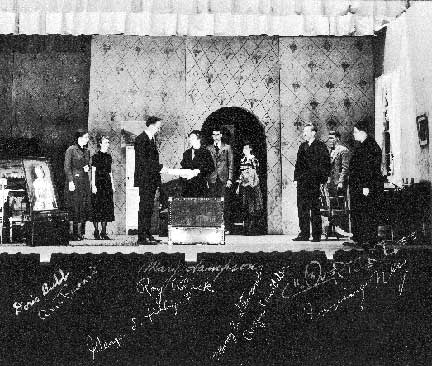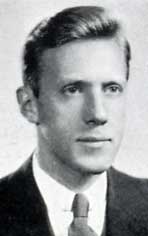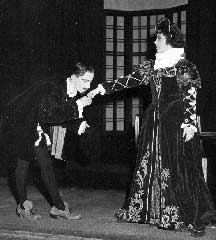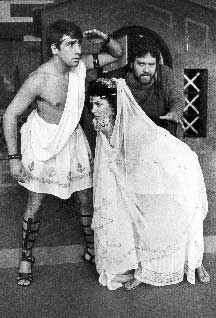
Distinction as the oldest continuously running campus organization in JMU history goes to the Stratford Players, the university's drama club.
The Stratford Players began as the Stratford Literary Society in 1914 at the Harrisonburg Normal School. Since its early years, the club's main goal has been to mount stage theater productions. What began as one major production per year has grown to five major performances, a children's theater production and several student-written plays per year.
According to JMU historian Raymond Dingledine, Jr., “The faculty, following the recommendation of its Committee on Literary Societies headed by Professor Johnston, voted to establish a new society, ‘The Stratford,' to cultivate and encourage the study of drama….With ten volunteers from the two existing societies (the Lee and Lanier Literary Societies) forming a nucleus, the Stratford Literary Society came into existence on January 31, 1914 with Mr. Johnston as an honorary member.”
Stratford 's initial focus was on reading theatrical works. The original club colors were pink and green, its flower, primrose, and its motto, “All the world's a stage, and all the men and women merely players.” The motto comes from As You Like It and “ Stratford ” refers to Shakespeare's birthplace, Stratford-on-Avon.
In 1919, Professor Johnston spearheaded a reorganization which, in part, renamed the Stratford Literary Society as Stratford Dramatic Club. The group also switched its focus to producing stage performances and began presenting a play a year at Harrisonburg 's New Virginia Theatre. The first Stratford theatrical production was A Midsummer Night's Dream. Other early productions include The Eastern Gate (1920), The Fan (1921) and Little Women (1924).
Leadership passed to Ruth Hudson in 1921. Dingledine described some of the advances led by Hudson. “The Stratford Dramatic Club expanded its activities in 1924 to two major production each year, usually one modern and one costume play. Until the gym and stage in Reed (Keezell) Hall were available, one of the plays was given in Sheldon auditorium and the other in Assembly Hall at the courthouse. A wide variety of plays were thus presented under the devoted direction of Ruth Hudson until 1935.”
By 1931, the Stratford Dramatic Club was producing two major productions and a group of three one-act plays per year. The following year, in 1932, the club switched performance stages, from Reed Hall to Wilson Hall. Stratford membership was consistently between 24 and 30 students.

Professor Argus Tressider brought many innovations to the Harrisonburg State Teachers College drama department in 1935. He headed the Stratford Players at a time when the club's resources included a stage that was too shallow, a poor lighting system, and two tiny dressing rooms.
There were also the thorny logistics of scheduling rehearsals and performances around dance, glee club and academic events. According to Dingledine, Tressider's “most startling innovation was the use of men in male roles, instead of the previous custom of girls dressed in masculine clothes taking such parts.”
In addition to directing the plays and speaking at club meetings, Tresidder also wrote plays, including The Sorority Phantom, (1938), The Fortune Teller, (1939) and the musical Love in the Curriculum, (1941). By his initiative, the Stratford Players performed one-act radio skits for Harrisonburg radio station WSVA.
Tresidder lent his talents to the Stratford Dramatic Club until 1939. He was later killed in World War II. The Stratford Dramatic Club lost a second advisor to the war, Leland Schubert, in 1943. Miss Ainslee Harris followed him as sponsor from 1944-1945. From 1938 until 1945 the Stratford Players put on a commencement play during finals week.
Dr. Mary E. Latimer (for whom the main stage theater is named) became the group's advisor in 1946. “Doc” Latimer, as she was affectionately called by students, was a professor of English at Madison College from 1945-1965. One of the Stratford members' favorite traditions was an annual camp, where they gathered around a fireplace and “Doc” told chilling ghost stories.
Another Stratford tradition was Stratford Day, on Shakespeare's birthday, April 23. Stratford Day was celebrated with a dramatic performance followed by a banquet for club members. In 1947 the dramatic club presented a parody of ‘Hamlet' in the chapel and feasted at a banquet in the Senior Dining Hall.
The Stratford Dramatic Club changed its title to the more informal name that is used know today, the Stratford Players, in 1952.
At that time, Stratford Player membership was chosen on a point system. Veteran members conducted classes in various phases of theater production. After taking some of these classes, “goats,” (prospective members), started doing stage work. Both classes and stage work earned points, and after earning 75 points a student became a member.
James O. Link advised the Stratford Players from 1960 and 1964 and was succeeded by Nancy O'Hare in 1964, the year that the departments of speech and drama combined. The first Stratford Players production under the Department of Speech and Drama was Death Takes a Holiday.

A new tradition was added to the Stratford Day Banquet called the Gold Key Awards, which were modeled after the Oscars. The banquet was held at the Holiday Inn throughout the 1960s, then moved to the Thomas House in Dayton.
In the late 1960s and early ‘70s, Horace Burr served as the Stratford Players' “Director of Drama.” Burr was a stage veteran with extensive theater and Hollywood experience. (Burr later designed the JMU seal).
Burr had co-directed with George Bernard Shaw and had a lead role at a Stratford-on-Avon theater. He brought national recognition to the Stratford Players by directing a performance of Death Takes a Holiday that was televised nationwide in the documentary Anatomy of a Play on an American College Campus.
Under his leadership, the Stratford Players expanded to three major performances per year and performed monthly one-act plays in the Experimental Theatre.
In 1967 Latimer-Shaeffer Theatre opened in the recently completed Duke Fine Arts Center (now Duke Hall). The theater was named after former Stratford Players advisor and theater director Mary Latimer Cordner (she married Broadway actor Cordner in 1965) and former music faculty Edna T. Shaeffer. This proscenium stage is the main stage for JMU's theater and dance performances and also houses a scene shop and dressing rooms.
The Stratford Players inaugurated the new main stage at the 1967 annual Madison College Fine Arts Festival with All's Well that Ends Well and Robert Sherwood's Pulitzer winner, Idiot's Delight. The latter production was televised by WSVA.-TV.
In 1973, Thomas H. Arthur was hired to develop the theater program. He was instrumental in transforming the extracurricular theater program into a department. Stratford Players leadership changed from a single advisor to a team of experienced faculty members. Arthur soon hired Allen Lyndrup, Thomas L. King, Pam Johnson, Phil S. Grayson and Roger Hall.
Lyndrup served variously as technical director, designer, and director and Pam Johnson as costume designer. Thomas L. King had directed and acted with Arthur for more than 10 years before they worked together with the Madison College theater program. Phil Grayson was technical director from 1976 to 2006 and he organized renovations of Latimer-Shaeffer Theatre which transformed a lecture and recital hall into a theater.
Both Arthur and King were dedicated to theater lab and in 1974 their efforts were rewarded by construction of the Wampler Experimental Theatre, also known as Theatre II. This became the home for student written and directed productions.
Arthur and others organized a highly successful dinner theater company that performed two to three productions each summer in 1975 and 1976. (See separate story).

The Dinner Theatre was extremely popular, performed for Student Orientation audiences, as well as local clubs and organizations. Performances were given in Gibbons Hall with Madison Food Services providing the meal.
A related group, the Madison Troupe, toured Germany and Italy, performing dinner theater for the USO (United Service Organizations). Stratford Players performed abroad again in 1982 at the Edinburgh Festival, under the direction of Roger Hall.
In the 1980s, students gained more opportunities to direct with the advent of the annual Director's Fest, a series of student-produced one-acts. This festival continues today and is the final project of the directing class each fall.
Today, Stratford Players members, School of Theatre and Dance majors, and open auditioners perform together in over a dozen performances a year. Pam Johnson has advised the Stratford Players since 2004 in addition to working side-by-side with students on costume design.
Johnson stressed the uniqueness of the Stratford Players as a campus organization. “The Stratford Players have a fiscal independence (box office revenue), but they are not independent of the School of Theatre and Dance. Members have a student presence in our academic theater program and can vote on play selections and budget decisions.”
Stratford Players members are eligible for the annual Stratford Players Scholarship as well as JMU's six other theater scholarships. Outside of members' participation in theater productions, the Stratford Players also hosts club events such as service days, an annual “Snowball” and the Stratford Prom.
-- August Smith
